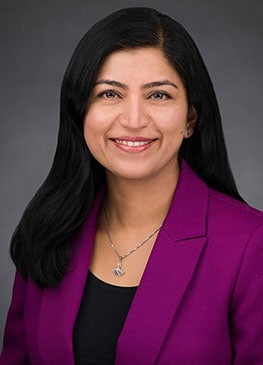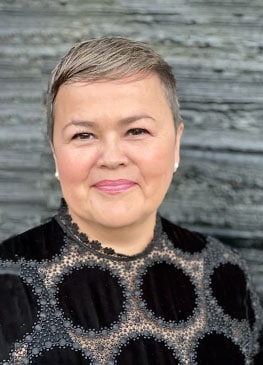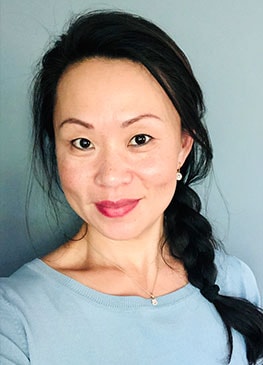Read the full interview here
-

Q. Tell us about where you grew up, and what were important early influences that really shaped who you are as a leader today?
A. I was born in a small town called Greensboro, in North Carolina. One thing that really shaped who I am is that before the age of 18, I moved 13 times. I’ve lived in about ten different states. That’s something that influenced me from the very beginning. I’ve been very extroverted because I had to make new friends quickly when I moved. I was always friendly because I was always having to start again, and so I learned resilience from an early age.
Another thing that marked my childhood was that my parents divorced when I was 13 years old. My mother, who had stayed at home as I was growing up, had to go back to work. That really was an inspiration, because it seemed to me that she was able to juggle it all. I knew from an early age that I wanted to be in business and also have a family and somehow make that work.
-

Q. You’ve had a sharp trajectory in your career. When you were promoted, what feedback did your bosses give you about why they were giving you these new opportunities?
A. Number one, I am genuinely a people person. I care about people, and I’ve been told that over and over. And I prioritize that. I spend at least one day per week only on people-related things. I will block my calendars and have one-on-ones, and mentor and coach people.
The other thing I would say is that my earlier brand was about being a fixer. And we all have a personal brand. Some of us are more aware of it than others, and it’s also important to know that your personal brand isn’t what you think it is; it’s what others think it is. And the more broken, the more complex, the more difficult the situation that needed to be turned around, I was the person who was called. I could fix a team situation, I could fix a technical situation, I could fix a functional situation, and I was the person that was just going to get it done no matter what.
One of the lessons I learned later is that strength became a payoff, like a drug, for me. All you had to do was come to me and say, “Mary Elizabeth, you’re the only person that can possibly do this work,” and I would fall for it and say, “Oh, yeah, let me do it.” And then I realized one day that I’m probably not the only person who could fix it.
And if I’m going to be the leader that I believe that I can be, I have to groom other people to be fixers. So about midway through my career, I started shifting away from this fixer competitive advantage to moving more into leadership.
-

Q. Talk more about how you did that.
A. I had to figure out what to let go of in order to lead. Time is finite, and so how you spend your time becomes incredibly important. And so I looked deep in myself and said, “What are the things that I couldn’t possibly think about giving away?” And I gave them away.
That was tough. But I said, “In order to be the leader I need to be, I need to take that core part of what my brand is and I need to give it away.” I wrote down all the things that were closest to my heart, and I gave them to someone else, including speaking to groups of employees or presenting to clients.
Another thing I gave away was letting perfect be the enemy of good. I really started choosing more carefully what issues I was going to focus on, and the things I was going to let be. In professional service, you have an inclination to want to pick up everything and make it better, but sometimes good is good enough.
-

Q. Do you feel like you’ve encountered any headwinds in your career because you’re a woman?
A. I have encountered some. I can tell you one story. When I was living in France, I was running a large transformation. I had just moved there and no one had really met me. I went to a big meeting, which I was running with a lot of senior partners. And then some of the men started giving me their coffee orders. “I’d like black. I’d like it with cream. I’d like two sugars.”
They thought I was the assistant, and in that moment, I wondered, “What am I going to do about this?” And you know what I did? I went and got the coffee, when I came back with the coffee, my boss was there and he said, “Oh, thank goodness. Mary Elizabeth is here now. We can start the meeting. Mary Elizabeth, over to you.”
I was holding a tray of coffees, and my colleagues were extremely embarrassed. And I said, “It’s no problem; I’ve now gotten coffee for you and you’re about to do some things for me.” And then I started the presentation.
-

Q. What is the most common mentoring advice that you give to other women?
A. The most common advice I give to women is to lean in and to go for it. Many people have heard the stereotypical story that if there’s a job description, a man might look at it and think, “Hmm, I’ve only done 20 percent of it but I’m sure I’ll get the role.” A woman can read the same job description and fit 80 percent of it and say, “Hmm, I don’t quite fit; I’d better not apply.”
And so my main advice to women had been to just lean in, because often times our fears of what could happen are way worse than the reality. So I often use the phrase “What’s the worst thing that could happen?” Let’s say you aren’t sure if you have the experience, but you apply anyway. The worst thing that could happen is you don’t get the job. But if you weren’t going to apply, you were never going to get it anyway. So that ability to lean in is really important because things are never as scary as what we think.
-

Q. What is your advice to the workhorses of the world who want to advance, but maybe aren’t comfortable promoting themselves?
A. My advice to the workhorses of the world is a piece of advice that I got from a mentor over 20 years ago: “Mary Elizabeth, to get ahead in business, you have to know something and you have to know someone.” What I typically find is that the workhorses of the world don’t know someone. They haven’t done the networking. They don’t have the political capital. They don’t have true sponsors in the organization. They haven’t been explicit about what they want and asked for it.
They’re sitting quietly, waiting for someone to recognize the work. But the work itself is probably less than 50 percent of the equation. It certainly helps you to move up the ranks in your career, but when you talk about getting to the senior-most levels, it’s less about the work and more about the network and your impact and how you market and brand what you’re working on. So make sure that you’re focusing 50 percent on what you know and 50 percent on who you know.







